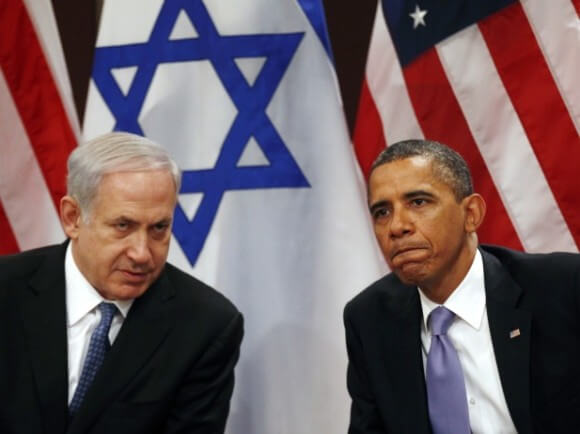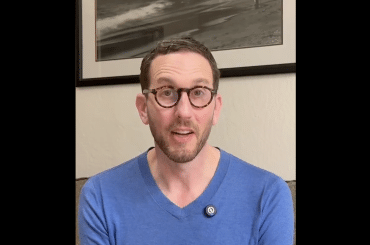President Obama started a Facebook page today, and we can guess who his first friend is. His statement this morning before his meeting at the White House with Israeli Prime Minister Netanyahu was certainly one-sided. Not a word about Israeli settlements. Remember when he used to speak about occupation? Another time, another country. And notice that all the violence is Palestinian. “Palestinian violence against its and Israeli citizens.”
Though the U.S. wants to “make sure that legitimate Palestinian aspirations are met through a political process.” Legitimate Palestinian aspirations. That would seem to mean: rights. But he can’t say so.
Because: “There’s no foreign leader who I’ve met with more frequently.” Translation: I don’t want to see this guy, but I have to because of the political pressure of the Israel lobby. And as for that pesky Iran deal that Netanyahu tried to destroy– just a fart in the wind! “A strong disagreement on this narrow issue,” Obama said.
Excerpts of Obama statement:
Well, it is very good to welcome once again Prime Minister Bibi Netanyahu to the Oval Office. There’s no foreign leader who I’ve met with more frequently, and I think that’s a testimony to the extraordinary bond between the United States and Israel….
This is going to be an opportunity for the Prime Minister and myself to engage in a wide-ranging discussion on some of the most pressing security issues that both our countries face. It’s no secret that the security environment in the Middle East has deteriorated in many areas. And as I’ve said repeatedly, the security of Israel is one of my top foreign policy priorities. And that has expressed itself not only in words, but in deeds.
We have closer military and intelligence cooperation than any two administrations in history. The military assistance that we provide we consider not only an important part of our obligation to the security of the state of Israel, but also an important part of U.S. security infrastructure in the region, as we make sure that one of our closest allies cannot only protect itself but can also work with us in deterring terrorism and other security threats.
In light of what continues to be a chaotic situation in Syria, this will give us an opportunity to discuss what’s happening there. We’ll have an opportunity to discuss how we can blunt the activities of ISIL, Hezbollah and other organizations in the region that carry out terrorist attacks. A lot of our time will be spent on a memorandum of understanding that we can potentially negotiate. It will be expiring in a couple of years, but we want to get a head start on that to make sure that both the United States and Israel can plan effectively for our defense needs going forward.
We’ll also have a chance to talk about how implementation of the Iran nuclear agreement is going. It’s no secret that the Prime Minister and I have had a strong disagreement on this narrow issue, but we don’t have a disagreement on the need to making sure that Iran does not get a nuclear weapon, and we don’t have a disagreement about the importance of us blunting and destabilizing activities that Iran may be taking place. And so we’re going to be looking to make sure that we find common ground there.
And we will also have an opportunity to discuss some of the concerns that both of us have around violence in the Palestinian Territories. I want to be very clear that we condemn in the strongest terms Palestinian violence against its and Israeli citizens. And I want to repeat once again, it is my strong belief that Israel has not just the right, but the obligation to protect itself.
I also will discuss with the Prime Minister his thoughts on how we can lower the temperature between Israelis and Palestinians, how we can get back on a path towards peace, and how we can make sure that legitimate Palestinian aspirations are met through a political process, even as we make sure that Israel is able to secure itself.
And so this is going to be a lot of work to do, with too little time, which is why I will stop here and just once again say, welcome.
Netanyahu’s statement includes his lip service to a “demilitarized” Palestinian state that “recognizes the Jewish state.” This is the new demand, now etched in stone, which Palestinians will never accede to, didn’t accede to when they recognized Israel a quarter of a century ago.
Almost his entire statement was about the savagery of ISIS and the terror and turbulence thoughout the Middle East. Here are the Palestinian bits:
Equally, I want to make it clear that we have not given up our hope for peace. We’ll never give up the hope for peace. And I remain committed to a vision of peace of two states for two peoples, a demilitarized Palestinian state that recognizes the Jewish state.
I don’t think that anyone should doubt Israel’s determination to defend itself against terror and destruction, and neither should anyone doubt Israel’s willingness to make peace with any of its neighbors that genuinely want to achieve peace with us. And I look forward to discussing with you practical ways in which we can lower the tension, increase stability, and move towards peace.



I find the interpretations in the article here overly cynical. Leaders can change their views and it is plausible that the collapse in Syria of Obama`s rosy vision have has its effects. It does not mean that he now is now charmed personally by Netanyahu, but that is beside the point. Obama is a considered person and for sure discerns personal taste in regard to people from attitudes to countries and situations.
Given what happened to his Syria vision Obama now seems to understand that running away from confronting hard situations is not a guarantee for calm – as the father of the main character in “Bonfire of vanity” tells his in-trouble son: if you run away from reality, reality will go after you. Obama already changed tack in Syria – taking a more aggressive approach – and also delayed the withdrawal from Afghanistan. This “lessons learning” applies also to his dealings with Netanyahu – he may now be less dismissive about the worries of the latter and don`t let unease in personal contacts overshadow realism. This Facebook gesture is likely a step in that direction and who knows the two leaders may even find in the end a way to each other`s heart – necessities can do miracles to relationships of all kinds (see the recent thawing in relationships between Israel and some erstwhile staunch Arab enemies of it).
“Well, it is very good to welcome once again Prime Minister Bibi Netanyahu to the Oval Office. There’s no foreign leader who I’ve met with more frequently” Obama.
Should read,
Obama , (legs crossed , behind his desk) .
Well , it is very good to welcome once again Prime Minister Bibi Netanyahu to the Oval Office.Just to let you know , my family ( jewels) have completely recovered from the attack they suffered during your last visit.(crosses legs to the other side).
Netanyahu , ( eyeing the gap in the Presidents desk).
I think we finally understand each other , right “Bro”.Now, about this 50 billion , I have changed my mind , let,s make it a cool 100 billion. Think of the upside , the Rube or the Donald will have to worry about it and you can enjoy your retirement.Have you played golf at Sheldon,s private course.Shall I put a word in for you.You can forget about all this I/P stuff and let me take care of that.
With regard to Israel/Palestine, Obama is long past disappointing.
That’s great news. MW made me worried for a few seconds, but now I’m over it. Thanks for the update, Phil!
Given our rotten policy, Obama has to say “aspirations” and not “rights” with respect to the Palestinians–you don’t engage in a long drawn out political processto obtain your basic human rights at some point in the distant future. You should have those immediately. So if Obama used “rights”, he’d be tacitly acknowledging that the Palestinians have the right to use violence to obtain them–he says Israel has the “right” to defend itself and Israel isn’t living under a brutal military occupation. They’re suffering from some attacks on their civilians and soldiers and police and they reply with tactics of collective punishment, added to the daily act of collective punishment which is the occupation.
I suppose the diplomats in American administrations probably think this through–they know they have to be hypocritical about the situation, because that’s the policy, so what words do they use? And this seems to be part of it–Israel has “not just the right, but the obligation” to defend itself, while Palestinians have some “aspirations” that maybe, if they behave themselves, might be granted to them after some political process.
There’s a method to this– you use soft rhetoric that gives the illusion of reasonableness to drape a veil over what amounts to blatant racism. I suppose diplomats and speechwriters pick this up as part of their profession, so it just comes naturally to them.